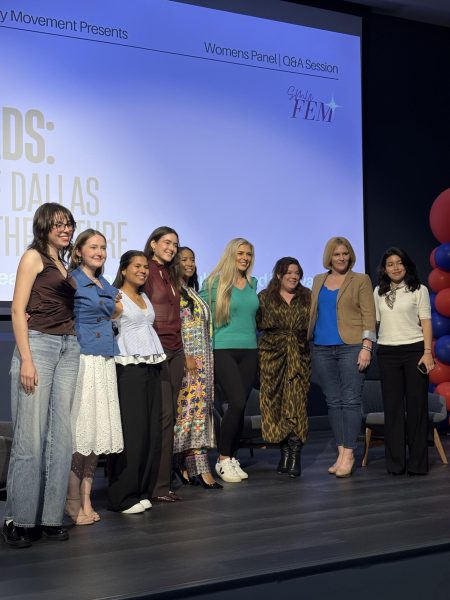Whether you were looking for mentorship, inspiration or advice that could better shape your 20s, SMU FEM’s event brought out all the stops.
SMU FEM (Feminist Equality Movement) is an organization that’s dedicated to creating an environment for those unfamiliar with feminism. Community is one of FEM’s goals for anyone who wants to educate themselves and understand what feminism is. That’s exactly what they did at their She Leads event.
The theme for the night, Women of Dallas Defining the Future, featured four inspiring women leaders, each with experience in innovation, arts and culture and sports.
Hosted in the Hughes-Trigg Auditorium on Tuesday, April 15, SMU students eagerly listened to the panelists’ stories about their journeys in their respective workforces. From sitting in city council meetings to reporting on women’s sports, and even being the only woman inside a lab, their experiences gave an inside look at the fight and adversity that they each faced.
The discussion was a chance for students to not only hear about how women are defining the future, but it was also an opportunity to continue building that bridge for individuals to truly understand what feminism is and the role it plays for women, said FEM President Lucia Hinojosa.
“We are trying to bridge this knowledge gap of really understanding what feminism is and applying it to leadership skills and empowering women to follow these similar career paths,” Hinojosa said.
Hinojosa led an impactful panel discussion that dove deep into these women’s experiences at work, home and even college. Although all of their backgrounds contrasted, there were overlaps in their experiences that seem common for women.

At 12 years old, it’s uncommon to have your dream career in mind, and it’s certainly even rarer to stick with it. Yet, Martine Philippe, the director of arts and culture for the City of Dallas, said that her goal of working in public service began when she was a dancer in New York.
Philippe noticed that her dance teacher was not only teaching–she was also working in public service. There, the switch flipped in Philippe, realizing that if her dance teacher could juggle everything with purpose and passion, so could she.
“The work I do in public service to contribute to quality of life for residents and visitors here in Dallas has to do with my positive experience in arts training and just wanting to give that back to the folks here,” Philippe said.
It’s not every day that you get to sit in the same room as someone who’s worked at ESPN, or maybe if you went to the panel, you were one of the lucky ones who got to hear Breanna Sorensen share her experience and approach to storytelling as a sports journalist.
“I started searching, I’m like ‘Okay, I love basketball so much, how can I keep this in my life forever,’” Sorensen said. “So I was like, ‘yay sports reporting.’ That’s a way I can keep it in my life forever, so that’s how I originally went into journalism.”
Sorensen described herself as a type A person, seemingly always trying to make sure she had a plan set for herself. Growing up playing basketball, Sorensen quickly realized that the possibility of her going pro was not in the cards for her. As she got older, Soresen saw sports reporting as the missing puzzle piece to keep sports in her life. While studying journalism in undergrad, she noticed how competitive journalism was, especially for female journalists, and knew that she would enhance it.
“I didn’t realize at the time how challenging it would end up being and how competitive, but I’m so happy I did it,” Sorensen said.
Having one U.S. patent is impressive, but having 12 is major. For Gabby Everett, that’s her reality as the director of business operations & strategy and site head for BioLabs Pegasus Park in Dallas. Everett’s background in science has led her to not only create innovation for women who would like to follow in her steps, but also allowed her to recognize the way in which so many never allow themselves the grace to celebrate their wins.
“My daughter, she’s ten and a half, she just got this district-wide innovation award,” Everett said. “I’m talking to her and I’m like ‘Hey, you seem awfully chill about this.’ She was like ‘Well, I don’t know if I should make a big deal about it.’”
At that moment, Everett encouraged her daughter not to downplay any achievement and to allow herself to feel proud of the hard work she was able to accomplish.
“Absolutely, you should toot your own horn about this,” Everett said.
Social impact has many different definitions and can mean something different for everyone. For Marissa Heyl, the 17 UN Sustainable Development Goals are something she and her lab follow. Heyl is passionate about one’s intentions to create change and seeing how it can lead to other findings.
For Heyl, that came when she had the ambition to work with women in underdeveloped countries, celebrating their traditional crafts while also empowering them.
“I know for me, I founded three creative ventures that have an equity and environmental sustainability piece,” Heyl said. “But equity and women’s empowerment, especially, that was always my goal to work with women in underdeveloped countries and would highlight their traditional crafts.”
















